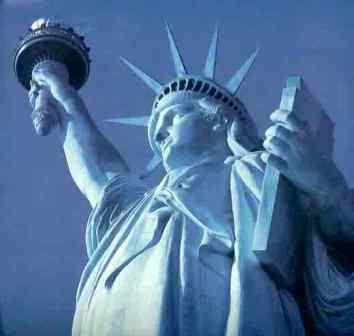|
restoring our biblical and constitutional foundations
|
Are We Still a Nation of Liberty-Lovers?
It will probably not surprise people who know me, but when it comes to politics I confess to being a mere novice. I dabble in it without devoting much time to it or being highly proficient in it. I am only a simple Greek professor with an amateur taste for international affairs. It is merely an avocation, which, by the way, I highly recommend to others, because we are now embroiled in two wars and may well be involved in another one very shortly.
The future indeed seems dire. Having two fires in a country village where there is only a small volunteer fire department is challenging enough without a third fire breaking out. My guess is that the president of Iran is quite prepared to talk peace in spite of all the belligerent bluster (on both sides) as long as his nation is able to pursue its civilian nuclear program without the constant threat of invasion from the West.
The Europeans, meanwhile, seem sadly perplexed about it all (I have recently been in Hungary, Romania, Ukraine, and Armenia), while Russia, which is deeply tied to Iran economically, opposes America’s saber-rattling and counsels tolerance and negotiations – anything within reason to avoid war.
I realize that there are many who are warm admirers of Mr. Bush, who say, “The impulse that moved the nation when we went to war with Iraq was the best possible endeavor of the sound moral instincts of democracy. It was the most generous act of our time.” To them I must seem a very lukewarm patriot indeed. I have never made a secret of my own anti-militaristic views. I believe Iraq is a dreadful catastrophe, and that there is practically nothing to be gained by allowing the fire to spread.
This is one reason I am paying careful attention to the words of Congressman Ron Paul, who alone among the 11 Republican candidates for president has become, whether intentionally or not, a spokesman for the opinion of peace-loving Americans – for the most part a righteously indignant opinion formed on the basis of constitutional and conservative principles.
Unlike George W. Bush, who is an amplificator imperii – an enlarger of empire, a man whose mind is Roman rather than Greek, a doer who cares little for speculative subtleties and distrusts introspection – Ron Paul is an inquisitive soul and far more vigorous an intellect than any of his fellow candidates. Ours is not a book-loving country, and few are schooled in economics. But Ron Paul can paddle his own economic canoe, both upon the treacherous upper reaches of the river as well as upon the smoother currents downstream.
The espousal of unpopular causes is by no means unfamiliar to him, and for ten terms in Congress he has been swimming against the tide. He alone has had the boldness to challenge openly the glorification of force and nationalism. His opponents believe in empire and progress, that the world can become a Garden of Eden, based on democratic principles. I have no doubt that, should anyone other then Ron Paul be elected, our next president will announce, like Signor Pococurante in Voltaire’s Candide, “I shall have another garden laid out tomorrow upon a nobler plan.” What nonsense!
Thankfully for liberty-loving Americans, Ron Paul’s momentum is rising. He has found in the Internet
a powerful ally scarcely used by his opponents – the weapon of the
twenty-first century that knows no frontiers or obstacles of time and
space, which has been used with such telling effect and which, I believe,
is destined to play an increasingly significant
 role
in all future elections.
role
in all future elections.
Like many of you, I have been following his Internet commentaries for some time, and occasionally I have in my own writings tried to sketch some of the perils and problems facing our great nation, and their remedies.
Of one thing I am absolutely sure: it is not too late or too soon to defend constitutional government, for liberty can survive only if people want it, and want it badly enough to fight for it. An ambition for world empire sustained by a loyalty bred of falsehood and force cannot, I believe, ultimately prevail in a nation of liberty-lovers.
It is therefore no time for pessimism. I would only remind my readers that government is the residuary of the successes and failures of us all, and that if we lose our liberties we will have no one to blame but ourselves.
December 10, 2007
David Alan Black is the editor of www.daveblackonline.com.